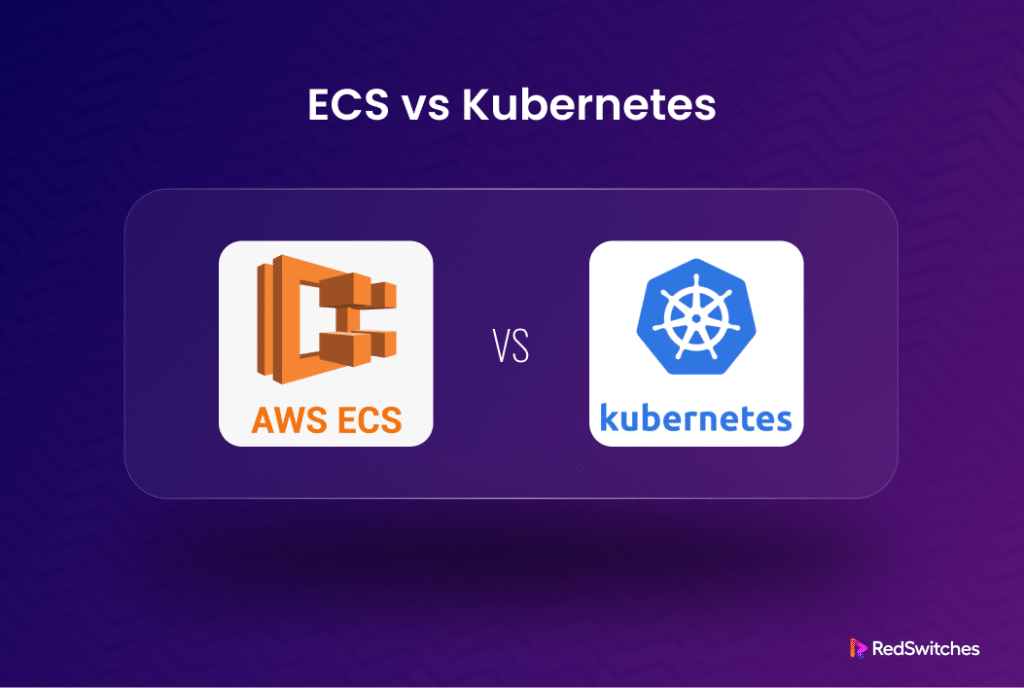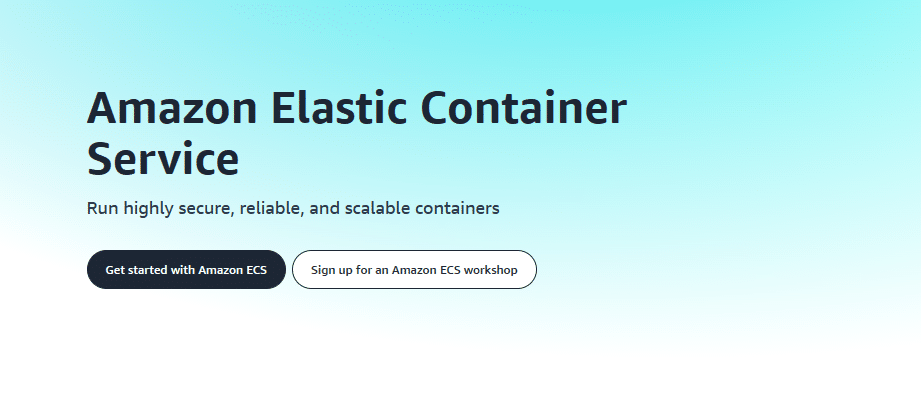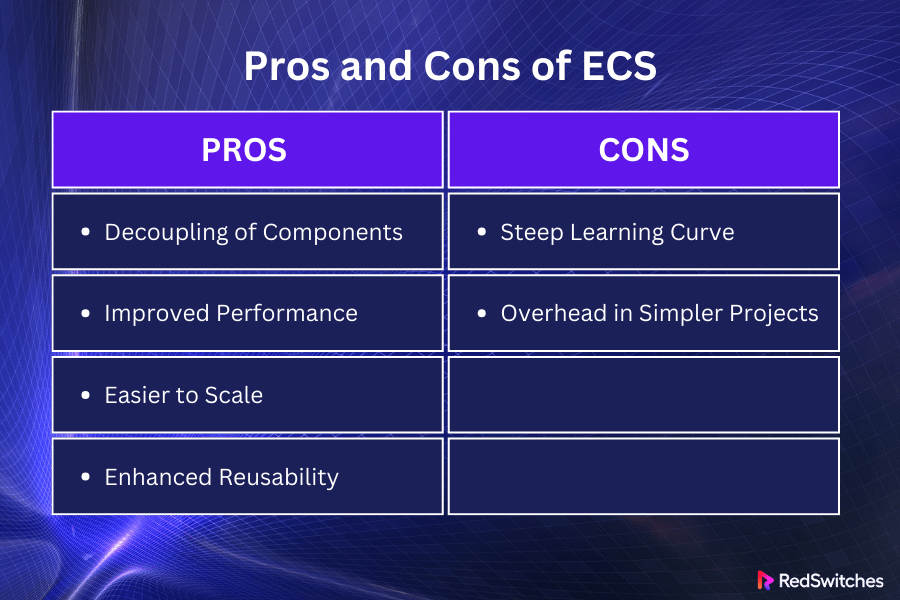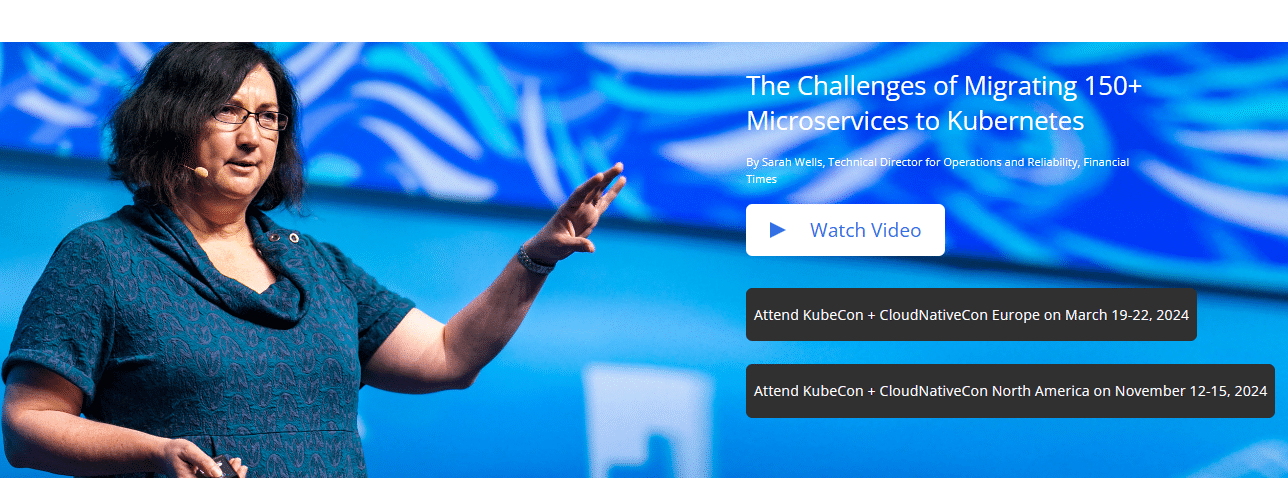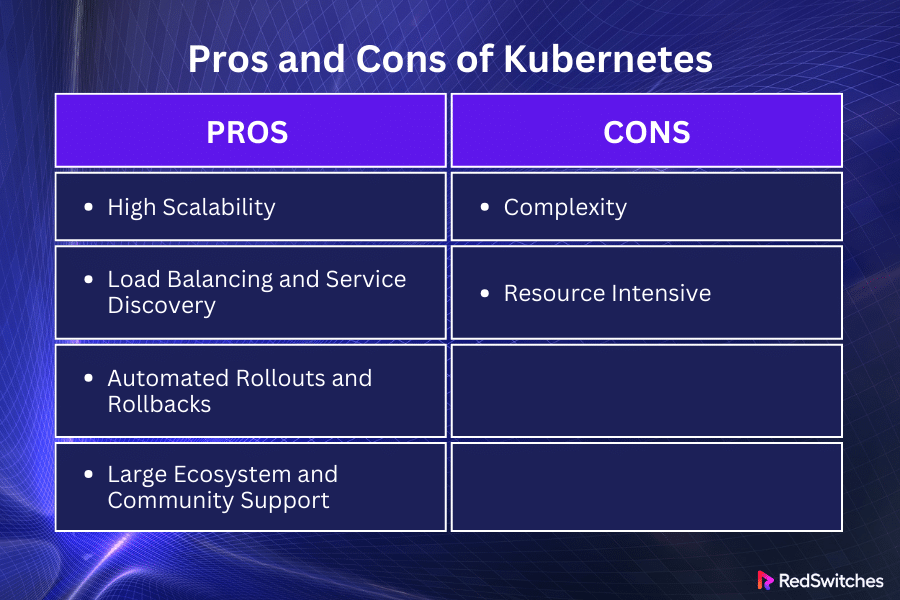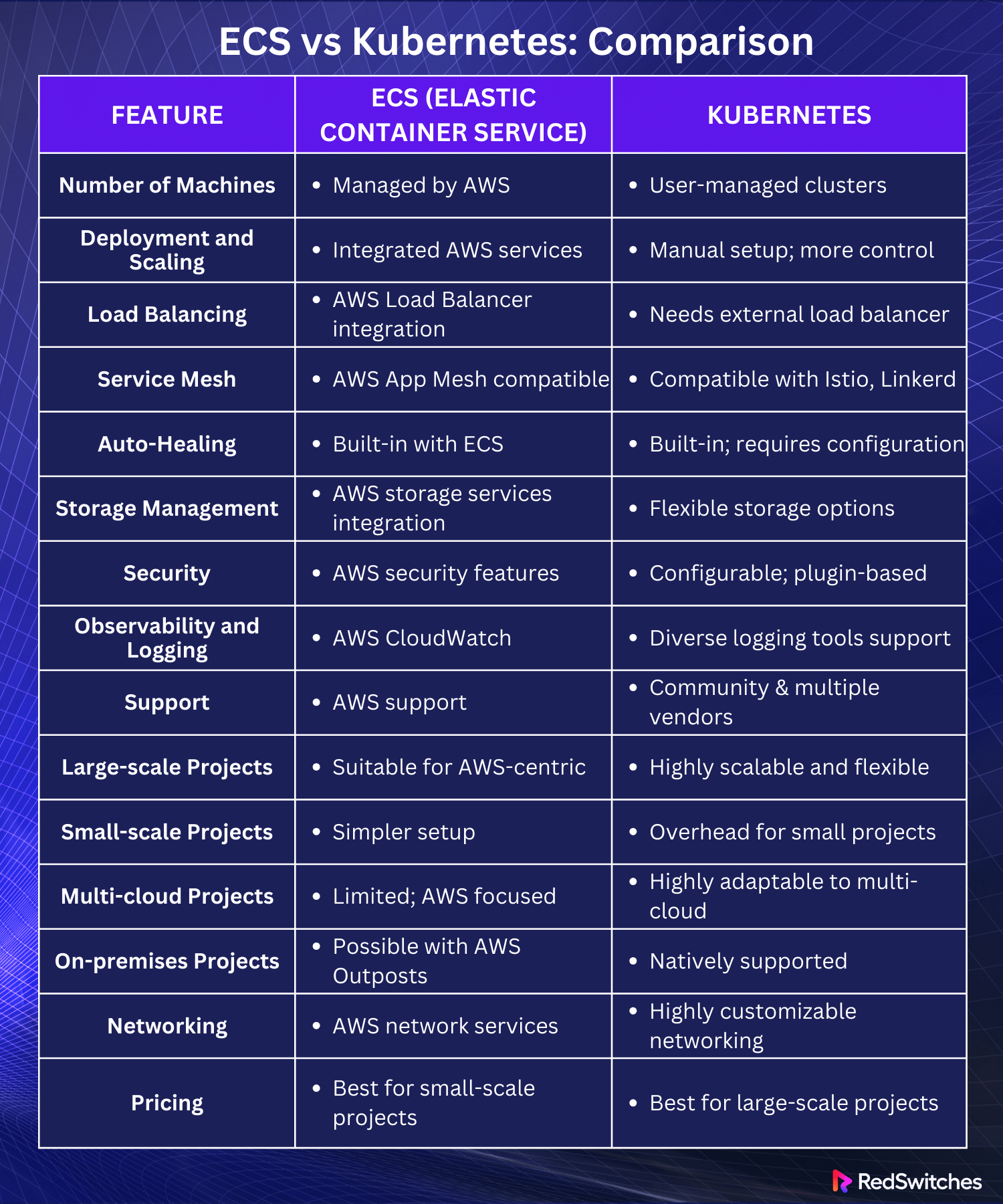Key Takeaways
- Amazon Elastic Container Service (ECS) is a managed container orchestration service provided by AWS.
- Pros of ECS include smooth integration with other AWS services, simplified management, and native AWS support.
- Cons of ECS include limited flexibility outside of the AWS ecosystem and potential vendor lock-in.
- Kubernetes is an open-source container orchestration platform for automating containerized application deployment, scaling, and management.
- Pros of Kubernetes customization, multi-cloud and hybrid environments support, and extensive community support.
- Cons of ECS include a steeper learning curve, complex setup and management, and dedicated resources.
- Kubernetes offers more granular control over deployments and scaling than ECS.
- ECS benefits from direct AWS support. Kubernetes relies on community and third-party support.
- When choosing between ECS and plain Kubernetes, it is essential to consider future proofing, cost implications, skill set, and expertise.
ECS and Kubernetes stand out as two top choices in container orchestration. These platforms have revolutionized how developers deploy, manage, and scale containerized applications, offering robust solutions to complex deployment scenarios.
A statistical survey showed that over 60% of organizations had adopted Kubernetes in 2022. The percentage has grown further ever since. Although ECS may not be as popular as Kubernetes, it is also a widely sought-after container orchestration platform for those users for whom Kubernetes might not be the ideal choice.
This blog will highlight the difference between ECS and Kubernetes, explore their pros and cons, and compare them based on various elements to help you determine which service between ECS vs Kubernetes might best fit your specific needs.
Table Of Contents
- Key Takeaways
- What is ECS?
- Pros and Cons of ECS
- What is Kubernetes?
- Pros and Cons of Kubernetes
- ECS vs Kubernetes: Use Cases
- ECS vs Kubernetes: Comparison
- ECS vs Kubernetes: Deployment and Scaling
- ECS vs Kubernetes: Number of Machines
- ECS vs Kubernetes: Load Balancing
- ECS vs Kubernetes: Service Mesh
- ECS vs Kubernetes: Auto-Healing
- ECS vs Kubernetes: Storage Management
- ECS vs Kubernetes: Security
- ECS vs Kubernetes: Observability and Logging
- ECS vs Kubernetes: Support
- ECS vs Kubernetes: Large-scale projects
- ECS vs Kubernetes: Small-scale projects
- ECS vs Kubernetes: Multi-cloud projects
- ECS vs Kubernetes: On-premises projects
- ECS vs Kubernetes: Networking
- ECS vs Kubernetes: Pricing
- How to Choose Between ECS vs Kubernetes
- Conclusion
- FAQs
What is ECS?
Credits: Amazon
Before we compare k8s vs ECS, it is important to understand what these terms stand for.
ECS stands for Amazon Elastic Container Service. It is a fully managed container orchestration service that Amazon Web Services (AWS) offers. It is designed to simplify the scaling, deployment, and management of containerized applications in the cloud. ECS is particularly popular among organizations that rely on AWS infrastructure.
A key reason behind its popularity is its smooth integration with the broader AWS ecosystem. This allows users to leverage AWS services such as IAM, VPC, and CloudWatch for enhanced container management and monitoring.
ECS provides two launch types: EC2 and Fargate. With the EC2 launch type, users can run containers on a cluster of Amazon EC2 instances, giving them more control over the underlying infrastructure.
The Fargate launch type allows for serverless container deployments, eliminating the need to manage the EC2 instances and enabling users to focus solely on their containerized applications. ECS offers features like auto-scaling, load balancing, and fine-grained security, making it a versatile and scalable solution for container orchestration in the AWS cloud environment.
Are you confused between Kubernetes vs Docker? Read our informative blog, ‘Kubernetes Vs Docker – Understand The Essentials.’
Pros and Cons of ECS
Below are the pros and cons of ECS:
Pros
- Decoupling of Components: ECS allows for a more modular design by separating data (components) and behavior (systems). This separation facilitates flexibility and easier maintenance, as changes to one component don’t necessarily impact others.
- Improved Performance: ECS can lead to performance gains, especially in game development. Systems operate on components, often processing multiple entities in a batch, which is conducive to data-oriented design and can take better advantage of modern CPU architectures.
- Easier to Scale: ECS architecture simplifies adding new features or entities without significantly altering existing systems. This scalability is particularly beneficial in complex and evolving projects like large-scale games.
- Enhanced Reusability: Components in ECS are reusable across different entities. This means developers can create various entities with unique behaviors by combining existing components, reducing the need for redundant code.
Cons
- Steep Learning Curve: ECS can be challenging to learn and understand for those accustomed to traditional object-oriented programming. It requires a shift in thinking about how data and behavior are organized, which can initially slow down development.
- Overhead in Simpler Projects: In small-scale or less complex projects, the overhead of setting up and maintaining an ECS architecture may not justify its benefits. The additional complexity might be unnecessary, and a more straightforward design could suffice.
What is Kubernetes?
Credits: Kubernetes
Kubernetes is an open-source platform curated to automate application container deployment, scaling, and operation. Initially created by Google and now maintained by the Cloud Native Computing Foundation, it provides a resilient framework for running distributed systems. It handles scaling and failover for your application, provides deployment patterns, and more.
The container orchestration platform provides a way to manage containers, which are lightweight, portable, self-sufficient packages that can run cloud-native applications. Containers can be run on physical or virtual machines, but managing them at scale is complex.
Kubernetes simplifies this by abstracting the underlying infrastructure. This makes deploying and managing containerized applications easier across various environments, whether in private data centers, public clouds, or hybrid systems.
Also Read: Azure Vs AWS: Exploring 9 Key Differences.
Pros and Cons of Kubernetes
Below are the pros and cons of Kubernetes:
Pros
- High Scalability: Kubernetes excels in scaling applications up or down quickly and efficiently based on demand. This makes it highly suitable for applications that experience variable workloads.
- Load Balancing and Service Discovery: It automatically manages load balancing and service discovery. This means it can distribute network traffic and ensure stable deployment, which is particularly useful for maintaining high availability and performance.
- Automated Rollouts and Rollbacks: Kubernetes allows seamless application updates and changes without downtime. Automated rollouts and rollbacks simplify maintaining and updating applications, thus enhancing operational efficiency.
- Large Ecosystem and Community Support: Kubernete’s open-source nature offers a large ecosystem and strong community support. It integrates with various tools and services, making it a flexible choice for different environments and use cases.
Cons
- Complexity: Kubernetes can be complex to understand and implement, especially for newcomers. Its steep learning curve and complex setup can be challenging for teams without the necessary expertise.
- Resource Intensive: It can be resource-heavy, particularly for smaller applications or environments. The overhead of running Kubernetes itself might outweigh the benefits for less complex applications.
ECS vs Kubernetes: Use Cases
Although both ECS and Kubernetes serve the same purpose, they may have varying use cases. Below are the primary use cases of ECS and Kubernetes:
ECS
Here are the use cases of ECS.
Simple Web Applications
ECS provides an easy-to-use, highly integrated environment with straightforward web applications for startups or small to medium businesses. It’s particularly beneficial for those already heavily invested in AWS.
AWS-Heavy Environments
ECS shines in scenarios where a company uses a range of AWS services. Its hassle-free integration with services like Elastic Load Balancing, AWS Fargate, and Amazon RDS makes it a compelling choice for businesses looking to leverage AWS’s full power.
Microservices with AWS Fargate
ECS is ideal for deploying microservices, mainly when used with AWS Fargate. Fargate allows for serverless deployment, meaning you can run containers without managing servers or clusters, significantly simplifying operations.
Kubernetes
Now let’s discuss the use cases of Kubernetes.
Large-Scale, Complex Applications
Kubernetes is the go-to for large enterprises with complex applications. Its ability to handle extensive workloads and diverse container management needs makes it ideal for large-scale deployments.
Multi-Cloud and Hybrid Environments
Kubernetes offers unparalleled adaptability for organizations operating across multiple cloud providers or hybrid cloud environments. Its cloud-agnostic nature allows for consistent deployment across different infrastructures.
On-Premises Deployments
Businesses with significant on-premises infrastructure can leverage Kubernetes because it is robust and compatible with various environments, unlike the predominantly cloud-oriented ECS.
DevOps and CI/CD Integration
Kubernetes integrates well with various DevOps tools and practices, including continuous integration and deployment pipelines. It supports various CI/CD tools, making it a favorite among DevOps teams.
Also Read: AWS Vs Oracle Cloud: Choose The Best For Your Business.
ECS vs Kubernetes: Comparison
Below is an in-depth comparison of the 15 differences between ECS vs Kubernetes:
ECS vs Kubernetes: Deployment and Scaling
Credits: Freepik
Let’s discuss the differences between these two in terms of deployment and scaling.
ECS
Deployment in ECS is straightforward, especially for those familiar with AWS. It directly integrates with AWS services like Elastic Load Balancing, simplifying application scaling and load distribution.
ECS can automatically scale the number of containers based on specified rules, efficiently handling varying loads. The scaling process is less complex but might lack some of the advanced configurations available in Kubernetes.
Kubernetes
Kubernetes has robust deployment and scaling capabilities. It provides more sophisticated strategies like rolling updates, canary deployments, and blue-green deployments, allowing for minimal downtime and high availability.
Kubernetes’ auto-scaling capabilities are highly configurable, not just at the container level but also at the level of nodes. This allows for precise control over how applications scale in response to demand, although it requires more setup and management effort compared to ECS.
ECS vs Kubernetes: Number of Machines
We should analyze the differences in the Number of Machines for ECS vs Kubernetes.
ECS
ECS integrates deeply with AWS services, providing a simplified setup for managing a cluster of EC2 instances or using AWS Fargate for serverless infrastructure. ECS automatically registers and deregisters instances, making it easier to scale the number of machines based on demand. It’s well-suited for businesses already invested in the AWS ecosystem, ensuring hassle-free management of various machines.
Kubernetes
Kubernetes offers a broader range of flexibility regarding the number of machines and where they are hosted. It can manage thousands of nodes, making it suitable for large-scale, complex deployments. However, this flexibility comes with increased complexity in setup and maintenance, especially when scaling the number of machines across diverse environments.
ECS vs Kubernetes: Load Balancing
Let’s delve into the distinctions in Load Balancing.
ECS
Since ECS integrates with AWS’s native load balancer offerings, namely the Elastic Load Balancer (ELB), this integration allows for automatic load balancer configuration when you define your ECS services. ECS supports both Application Load Balancers (ALBs) and Network Load Balancers (NLBs), providing high flexibility.
The ALB is particularly useful for HTTP/HTTPS traffic. It offers advanced routing features, while the NLB is ideal for low-latency, high-throughput TCP/UDP traffic. This native integration with AWS services simplifies the setup and maintenance of load balancing in ECS.
Kubernetes
Kubernetes offers a more generalized approach to load balancing. This makes it compatible with various cloud providers and on-premises solutions. It uses the concept of Services and Learn Ingress to manage external access to the services in a cluster. Kubernetes Services provides an abstract way to expose an application running on a set of Pods.
The Ingress resource manages external access to the services, typically HTTP, and can provide load balancing, SSL termination, and name-based virtual hosting. Kubernetes supports a range of cloud-based and hardware-based load balancers, offering a versatile and flexible solution that fits a variety of deployment environments.
ECS vs Kubernetes: Service Mesh
Let’s explore the variations in Service Mesh for these two.
ECS
In the context of ECS, AWS offers the AWS App Mesh, a service mesh that provides application-level networking. This allows ECS users to control and visualize the communication between their services. App Mesh standardizes how your services communicate, giving you end-to-end visibility and helping to ensure high availability for your applications.
It provides features like traffic routing, circuit breaking, and retries, which are essential for managing microservices efficiently. The integration of App Mesh with ECS simplifies the implementation of service mesh features, making it accessible even for those not deeply versed in cloud-native technologies.
Kubernetes
The most popular service mesh implementation for Kubernetes is Istio, though other options like Linkerd and Consul exist. Istio extends Kubernetes and integrates with its features, providing powerful tools for managing microservices. It offers advanced traffic management capabilities like canary deployments, A/B testing, and rich metrics and tracing functionalities.
Istio’s control plane provides an abstraction layer over the underlying cluster management platform. This means it can be used across different environments, not just Kubernetes.
ECS vs Kubernetes: Auto-Healing
Let’s break down the variances in Auto-Healing between these two.
ECS
ECS offers auto-healing functionalities by tightly integrating with AWS services. In ECS, if a container becomes unhealthy, it is automatically stopped and replaced. The service relies on defined health checks and integrates with AWS’s load balancers to ensure smooth operation.
These checks ensure that ECS swiftly responds to any issues, maintaining the desired count of running containers. The integration with AWS CloudWatch also allows for monitoring and alerting, contributing to the auto-healing process.
Kubernetes
Kubernetes has a more sophisticated and customizable auto-healing system. It constantly monitors the state of pods and nodes. If a pod fails, Kubernetes’ controller notices the state change and works to reconcile the difference.
This includes restarting failed containers, rescheduling pods to healthy nodes, and even replacing and reorganizing entire node clusters if necessary. Kubernetes’ auto-healing is more extensive as it covers container-level issues and manages the broader cluster health.
ECS vs Kubernetes: Storage Management
Let’s analyze the differences in Storage Management.
ECS
In ECS, storage management is handled through the integration with AWS services like Elastic Block Store (EBS) and Elastic File System (EFS). ECS allows you to define storage volumes in task definitions, which can be mounted to containers.
This integration with AWS storage solutions offers high durability and availability. However, the storage management in ECS is somewhat dependent on AWS infrastructure, which might limit flexibility in certain use cases.
Kubernetes
Kubernetes offers a more versatile storage management system. It supports many storage solutions, from local storage to cloud-based options like AWS EBS, Google Persistent Disk, etc. Kubernetes abstracts the storage layer through Persistent Volumes (PV) and Persistent Volume Claims (PVC), providing a uniform way to manage storage irrespective of the underlying infrastructure.
This abstraction allows for more complex storage scenarios and is one of Kubernetes’ strengths, offering greater flexibility and portability across different environments.
ECS vs Kubernetes: Security
Credits: FreePik
Let’s examine the distinctions in Security for these two.
ECS
ECS offers robust security by integrating tightly with AWS’s IAM (Identity and Access Management), allowing for fine-grained access control. It also benefits from AWS’s strong security posture, including compliance with various certifications and standards. The AWS infrastructure provides additional layers of security, such as network isolation, encryption, and more.
Kubernetes
Given its flexibility and extensibility, Kubernetes has a more complex security model. It offers robust security features like role-based access control (RBAC), secret management, and network policies for traffic control. However, securing a Kubernetes environment often requires manual configuration and maintenance, especially in multi-cloud or on-premise scenarios.
ECS vs Kubernetes: Observability and Logging
Let’s discuss the differences between ECS vs Kubernetes regarding Observability and Logging.
ECS
ECS provides integrated observability and logging features, especially with other AWS services like CloudWatch for logs and metrics and X-Ray for tracing. This integration simplifies monitoring and logging but might be limiting for those seeking more customized or granular observability solutions.
Kubernetes
Kubernetes offers various tools for observability and logging with its extensive ecosystem. Popular choices include Prometheus for monitoring and Grafana for visualization, which can be more complex to set up but offer extensive customization and powerful features. Kubernetes also supports various logging tools like Fluentd and ELK Stack, allowing users to choose the best tools for their specific needs.
ECS vs Kubernetes: Support
Diving into the differences in Support for ECS and Kubernetes.
ECS
AWS provides comprehensive documentation, an active user community, and professional support options for ECS. This support is particularly beneficial for teams already embedded in the AWS infrastructure, as it ensures a seamless and well-supported integration with other AWS services.
Kubernetes
As an open-source system, Kubernetes has an excellent community support system. It benefits from contributions from a global community of developers and a wide array of third-party tools and extensions. Major cloud providers, including Google Cloud, AWS, and Microsoft Azure, offer managed Kubernetes services, which come with their professional support.
Kubernetes’ widespread adoption has also led to a wealth of online resources, forums, and professional services specializing in Kubernetes deployments and troubleshooting.
Also Read: DevOps Best Practices For Successful Implementation.
ECS vs Kubernetes: Large-scale projects
Credits: FreePik
Breaking down the differences in Large-scale projects between these two helps understand their implications.
ECS
ECS is highly efficient for large-scale projects, especially when integrated within the AWS ecosystem. It simplifies container management and scaling, allowing for the automatic scaling of applications based on demand. ECS is particularly adept at handling large batch jobs and workflows deeply integrated with AWS services. However, its dependency on AWS might be a limiting factor for projects that require a multi-cloud or on-premises setup.
Kubernetes
Kubernetes excels in large-scale, complex projects requiring high levels of customization and flexibility. Its ability to run on any environment, whether cloud, on-premises, or hybrid, makes it a highly versatile tool for large-scale projects. Kubernetes can easily manage extensive clusters and workloads, offering powerful tools for automation, scaling, and self-healing.
This makes it a preferred choice for enterprises that need a robust, scalable, and cloud-agnostic platform. Kubernetes’s learning curve and complexity can be challenging, but its scalability and flexibility are unparalleled for large-scale deployments.
ECS vs Kubernetes: Small-scale projects
Exploring the differences in Small-scale projects.
ECS
ECS is often favored for small-scale projects, primarily due to its straightforward integration with AWS services. It’s an excellent choice for startups or smaller teams that don’t require the complexities of Kubernetes.
ECS provides a more straightforward, managed experience, making deploying and managing containers easier without extensive container orchestration expertise. This ease of use and reduced overhead can benefit small-scale projects with limited resources and expertise.
Kubernetes
While Kubernetes is more complex and might initially seem like overkill for small-scale projects, it offers scalability and flexibility that ECS might not. Starting with Kubernetes could be the way to go for projects expected to grow rapidly or require more complex orchestration in the future. However, the overhead of managing a Kubernetes cluster might not be justified for small, simple projects.
ECS vs Kubernetes: Multi-cloud projects
Let’s break down the differences in Multi-cloud projects between these ECS and Kubernetes.
ECS
Although ECS’s integration with AWS can be both a benefit and a limitation, for exclusively AWS projects, ECS offers seamless integration and optimization. However, this close AWS integration might be a drawback for multi-cloud projects. ECS is not designed for a multi-cloud environment, so if you plan to deploy your application across different cloud providers, ECS might not be the best fit.
Kubernetes
Kubernetes excels in multi-cloud environments. Its open-source nature and wide adoption make it a universal solution that works consistently across different cloud providers. This universality allows more flexibility in deploying and managing applications across various cloud infrastructures, making Kubernetes a preferred choice for multi-cloud projects.
The ability to avoid vendor lock-in and maintain consistent operations across different environments is a significant advantage of Kubernetes in a multi-cloud strategy.
ECS vs Kubernetes: On-premises projects
Let’s break down the disparities in On-premises projects between these two options.
ECS
Due to it being initially designed for seamless integration with Amazon Web Services, ECS can be slightly challenging to implement in an on-premises environment. This is because it’s optimized for the AWS ecosystem and relies heavily on AWS-specific features and services. However, with the advent of AWS Outposts, running ECS in an on-premises setup has become somewhat easier, though it still requires a substantial AWS footprint.
Kubernetes
Kubernetes is inherently more flexible and adaptable to on-premises environments. It is not tied to any specific cloud provider, making it a go-to choice for businesses seeking a container orchestration platform that can run seamlessly both in the cloud and on-premises. Kubernetes’ versatility and open-source nature allow it to integrate well with various environments, including on-premises data centers.
ECS vs Kubernetes: Networking
Now Let’s examine the distinctions in Networking for these two.
ECS
Networking is managed through AWS’s VPC (Virtual Private Cloud) in ECS. This allows users to define a virtual network within the AWS ecosystem. This setup simplifies networking as it is deeply integrated with other AWS services. ECS supports different network modes like awsvpc, bridge, host, and none, providing a range of networking options based on the level of isolation and exposure required for containers.
Kubernetes
Kubernetes offers a more complex but highly flexible networking model. It requires understanding concepts like pods, services, and ingress/egress rules. Kubernetes supports a range of networking plugins through the Container Network Interface (CNI), allowing users to implement various networking solutions tailored to their specific needs. This flexibility benefits complex networking requirements but can introduce a steeper learning curve.
ECS vs Kubernetes: Pricing
Finally, let’s delve into the differences in Pricing for these two to allow for a better comparison.
ECS (Best for Small-Scale Projects)
ECS is available for free. However, users may incur costs. The primary costs are associated with your AWS resources, depending on your chosen launch type, such as the AWS Fargate Launch Type Model or the Amazon EC2 Launch Type Model.
Since the pricing can vary from user to user, you can better understand it by contacting sales support here.
Kubernetes (Best for Large-Scale Projects)
As an open-source platform, Kubernetes doesn’t have a direct cost for usage. However, the costs come from the infrastructure it runs on. If you run Kubernetes on AWS, you must pay for EBS snapshots, EC2 instances, and EBS volumes. You may also incur costs related to other AWS services, like Route 53 and Elastic Load Balancing (ELB).
The expenses associated with your Kubernetes cluster will depend on several factors, such as the type and size of servers used, the number of nodes in your cluster, your storage needs, and the network traffic your applications generate.
How to Choose Between ECS vs Kubernetes
Although comparing the difference between ECS vs Kubernetes discussed above can offer valuable insight into which is best for you, considering the following three factors can help you further ensure you make an informed decision.
Cost Implications
Choose between the two by keeping cost implications in mind.
ECS
ECS is particularly cost-effective if you’re already invested in the AWS ecosystem. The pricing model is simple, based on the resources you use. There are no additional charges for the ECS service itself. This makes ECS a potentially more affordable option for startups and small to medium-sized businesses looking for a simple pricing structure and already using AWS services.
Kubernetes
Kubernetes doesn’t have a direct cost for the software itself. However, the real cost lies in the infrastructure it will run on and the expertise required to manage it. Running Kubernetes can be more expensive if you opt for a managed service from cloud providers like Azure Kubernetes Service (AKS). Self-managing Kubernetes can reduce costs but requires a significant investment in setup and maintenance.
Want to learn more about Kubernetes? Read our informative beginners guide, ‘Kubernetes 101: Beginners Guide To Kubernetes.
Skill Set and Expertise
Or you can choose between the two by keeping your Skill Set and Expertise in mind.
ECS
ECS is generally easier to use, especially if you’re familiar with AWS. It integrates well with other AWS services, providing a more streamlined experience. The learning curve is less steep for teams already using AWS, making it a good choice for those with limited container orchestration experience.
Kubernetes
Kubernetes is known for its steep learning curve. It requires a deeper understanding of container orchestration concepts and architecture. However, this complexity comes with high levels of customization and control. If your team has the expertise or you’re willing to invest in training, Kubernetes offers a robust solution capable of handling complex container orchestration needs.
Future-Proofing
Credits: FreePik
You can also choose between the two by keeping Future-Proofing in mind.
ECS
While ECS is highly integrated with AWS, this can also be a limitation if you move away from AWS or adopt a multi-cloud strategy. It’s an excellent choice for businesses that foresee staying within the AWS ecosystem.
Kubernetes
Kubernetes shines in future-proofing your infrastructure. Its cloud-agnostic nature means you can run it anywhere – on-premises, in the cloud, or in a hybrid setup. This flexibility makes Kubernetes a strong contender for businesses looking to avoid vendor lock-in and those considering long-term scalability and multi-cloud strategies.
Conclusion
When comparing ECS vs Kubernetes, both platforms offer outstanding container orchestration solutions. While ECS is smoothly integrated with AWS services, offering a more straightforward approach, Kubernetes shines for its large ecosystem and versatility across various environments.
The choice between elastic container service vs Kubernetes depends largely on your specific requirements, existing infrastructure, and the scale of your operations.
Exploring professional services like RedSwitches can be a game-changer for organizations leveraging the best cloud technology and container orchestration. RedSwitches provides expert cloud solutions, ensuring your infrastructure is robust and optimized for performance and cost.
Our services can help you effortlessly navigate the complexities of container orchestration, whether you choose ECS, Kubernetes, or a hybrid approach. Visit our website now to learn more about how we can empower your container orchestration strategy.
FAQs
Q. Is ECS the same as Kubernetes?
No, ECS (Elastic Container Service) and Kubernetes are different container orchestration tools. ECS is a proprietary AWS service, while Kubernetes is an open-source platform.
Q. Is ECS better than EKS?
Which between ECS vs EKS is better depends on the use cases. ECS is more integrated with AWS and more straightforward to use, while EKS (Elastic Kubernetes Service) provides Kubernetes’ flexibility and extensive features within AWS.
Q. Is ECS the same as Docker?
No, ECS is not the same as Docker. ECS is a container orchestration service, while Docker is a platform that enables containers to be built, run, and packaged. ECS can manage containers created by Docker.
Q. What is the difference between AWS ECS and Kubernetes?
AWS ECS (Elastic Container Service) is a proprietary container orchestration service provided by Amazon Web Services, while Kubernetes is an open-source container management tool.
Q. How do AWS ECS and Kubernetes compare in terms of deployment?
AWS ECS is more tightly integrated with other AWS services, making deploying containers on AWS infrastructure easier. On the other hand, Kubernetes offers greater flexibility as it can be deployed on various cloud providers or on-premises.
Q. Can AWS ECS and Kubernetes be used together?
While it is possible to use AWS ECS and Kubernetes in the same environment, choosing one over the other is more common based on specific requirements and preferences.
Q. What are the key differences between AWS ECS and Kubernetes clusters?
AWS ECS manages clusters through the AWS Management Console, offering a more managed service approach. Kubernetes, on the other hand, provides more control over cluster management and configuration.
Q. Which one is more cost-effective, AWS ECS or Kubernetes?
In terms of cost, AWS ECS may be more cost-effective for users invested in the AWS ecosystem. Kubernetes can offer cost savings when running large-scale container deployments across multiple cloud providers.
Q. Can AWS Fargate be used with both AWS ECS and Kubernetes?
AWS Fargate, a serverless compute engine, can run containers with AWS ECS and Kubernetes without managing servers or clusters.
Q. What is the role of Amazon EKS in comparing AWS ECS and Kubernetes?
Amazon EKS (Elastic Kubernetes Service) is a managed Kubernetes service by AWS. It allows users to run Kubernetes on AWS without installing, operating, and maintaining their own Kubernetes control plane.
Q. When should I choose Amazon ECS over Kubernetes?
Amazon ECS is preferred when you want a more straightforward and easier-to-use container service, especially if you already use other AWS services.
Q. Can Kubernetes be deployed on AWS?
Yes, Kubernetes can be deployed on AWS through self-managed clusters or AWS EKS (Elastic Kubernetes Service).
Q. How do Amazon ECS and Kubernetes compare in terms of scalability?
Both Amazon ECS and Kubernetes offer scalability options, but the ease of scaling might vary based on the specific use case and requirements.
Q. Which service is better for beginners, Amazon ECS or Kubernetes?
Amazon ECS is often considered more beginner-friendly due to its managed nature and seamless integration with other AWS services.
Q. How does Amazon ECS differ from plain Kubernetes?
Amazon ECS provides a more opinionated and managed approach to container orchestration, while Kubernetes offers more flexibility and customization options.
